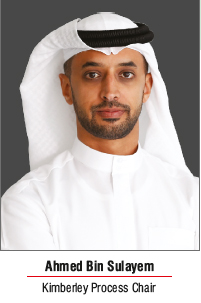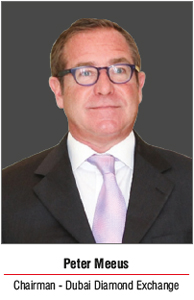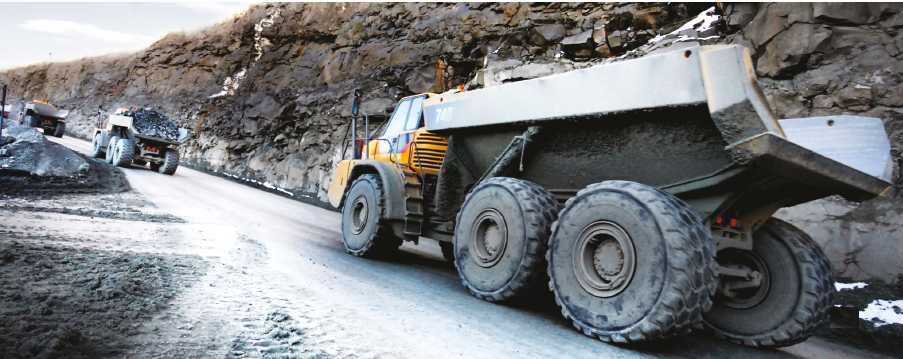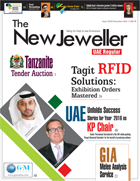|
UAE sets Precedents as KP Chair 2016
Permanent Secretariat at the UN and Rough Diamond
Valuation take centre stage

 In an exclusive with Subbu, Business Editor, The New Jeweller Group, Mr Ahmed Bin Sulayem, Chair Kimberley Process 2016 and Mr Peter Meeus, Chairman Dubai Diamond Exchange opine on the activities of KP during the year and the various precedents that UAE as the KP chair has set for the benefit of Diamond Industry.
In an exclusive with Subbu, Business Editor, The New Jeweller Group, Mr Ahmed Bin Sulayem, Chair Kimberley Process 2016 and Mr Peter Meeus, Chairman Dubai Diamond Exchange opine on the activities of KP during the year and the various precedents that UAE as the KP chair has set for the benefit of Diamond Industry.
As the Kimberley Process Chair you have travelled to more than 15 economies something that has happened for the first time in the history of KP for deliberations and discussions pertaining to Diamond Mining and supply chain business. How has been your experience and conclusions?

If you look at past Chair countries, I believe every country would have had their own advantages as to why it was appropriate for them to become the chair and why they would have felt can add value to build the Diamond Industry. For UAE too it was indeed time to take on the reins of the Kimberley Process and work towards consolidating the Diamond sector and more so because UAE closely works with the African countries and their interests. This is the only reason that so many economies opened their doors for KP when UAE took over as the KP Chair. The other advantage that we have is that we can bring both the European economies as well as African economies on the same table for discussions and deliberations which is not an easy task and is only because of the strong relationship that we share globally and this is the most important reason as to why UAE had been chosen to helm the KP for the year 2016. It was also not easy to discuss the compliances pertaining to legitimate Diamond trade with some economies for eg: Burkina Faso who have had an infamous history of smuggling Diamonds out of the country. So we suggested to open a KP office there so that they in turn understand the compliances and act accordingly. All African countries according to me would want to develop or build their infrastructure; and Mining is their only and major means of economic revenue. I always give them the example of UAE. Before setting up the DMCC there was practically no Diamond trade happening in the country and now with DMMC and it structured progress, we are seeing a trade of over 30 Billion Dollars of economic revenue to the country. Another point that I would like to mention here is that countries like Mozambique who have also applied for becoming a KP member which is in an undecided stage for quite some time now, will be sorted and very soon I presume will be adopted as a member of KP. Regarding CAR too I have myself seen and feel the economy and people out there are doing hard work and are trying to get into the KP process compliance mode which would be really good for the development of their economy and also for the industry as a whole and we as the KP Chair went all out to get them inducted into the Kimberley Process.

The historical trust that UAE enjoys over hundreds of years is also the reason why UAE as the KP chair was received with open arms. Over the years of KP’s existence, we have not seen any Chair travelling to so many economies or seeking to open doors for a number of mining countries and bring them to a neutral table for discussions. This is again for the first time that the KP Chair has actually visited mines inside the pits and got a first hand information of the state of affairs of the respective economies.
The Chair thus feels that it is high time we act instantly and save millions of lives and their livelihood.
What is your opinion on Rough Diamond Valuation pertaining to Mining economies. Do you think it will be successful in addressing the many concerns of the producers?

When we sent the proposal initially we wanted a feedback from everyone and did not want this valuation process to dilute. For issues like these it is not essential that everybody agrees to the proposal or plan and we are really not the ones who are dictating it. There was a challenge regarding valuation and we during the position of Chair of KP saw an opportunity to address this issue but if some Industry members influence the producers against valuation just because it eats up their margins, then it is indeed a sad reality. Our motive of moving this resolution was to at least start the process and let the Producing countries have a price list or understand a pricing mechanism so that they do not end up underselling their hard earned produce. This will probably also solve the problem of price determination when the Rough arrive at Diamondcentres and eliminate price related confusions.

It is indeed surprising and a sad reality that some of the Industry members feel that there is really no need for Rough valuation process to be initiated within producing countries. But to add to that we have had positive response from at least two large producing nations who are in all encouragement to put in a system for rough valuation.
Going forward since there are some economies agreeing to the valuation process and some not, do you see a partial adoption of the system by certain producing countries and thereby accelerating the price related confusions?
Mr. Ahmed Bin Sulayem would rather that the valuation process is initiated under the aegis of the Kimberley process. I would also like to add that if there is a system that needs to be initiated for the benefit of the respective economy and the Industry as a whole why should there be a resistance. When we did a workshop in valuation, at first in Luanda, I felt that this was just another workshop but this really took up the realities pertaining to price mechanism and kicked off the dire need for a Rough Valuation system implementation.
Why do you feel there is a need for a permanent secretariat in the UN pertaining to the Diamond Industry?

Today it is no longer the KP what it used to be. The situation today is that of the members. The Kimberley Process have grown two or three folds and at the same time the magnitude of the civil society has shrunk in comparison with the growth of KP. Even entities like CIBJO are discussing to have an “Observer status” within the Kimberley Process. So the KP as an entity is itself become a large body than what it was years back and pertaining to countries such as Venezuela, CAR and many others, you need a representation that has resources on the ground and working in many other departments and I feel who
better that the United Nations.

We have looked at this little differently. We do not really want a heavy department with huge documentations and processes and study as a representative, but we really want a tool on the ground in those countries which is reeling under sanctions to help them, educate them make them understand the compliances and nurture them to come back into the world of progress. This can also be on a temporary basis, but there should be a focussed approach towards the producing nations. The current situation is that if there is a sanction implemented on a specific country, there is completely a void as to how and when is time for the said sanctions to be lifted and the respective economy can come back into global trade. This we witnessed ourselves that there is no basic needs available such as water and food for millions of people living in dire conditions, only because their country is under sanctions and they are invariably closed to the world. Thus we need a United Nations because they are already there working to better the lives and who else than them to focus on the Diamond sector as well. I think in general people are afraid of large bureaucratic structures that’s always the case. Through seeking a permanent secretariat the UAE does not wish to helm the affairs at the UN, but UAE in its effort to work towards the betterment of the industry has requested the UN to have a seat. We would be happy if the permanent secretariat is headed by someone from one of the African producing nations.
Do you think it was important for the Civil Society to have played a larger role in the KP plenary this year?

The Civil Society has been boycotting the UAE as the KP chair from the beginning and we really do not know why the Civil society is biased towards the UAE as the KP Chair. No previous chair like China, Angola, Russia etc has been treated the way Civil society has done to UAE as the KP Chair. Mr Albert Kabuya Muyeba, former KP focal point from CENADEP in the Democratic Republic of Congo (DRC) is present here and is very supportive of the efforts of UAE as the KP chair and the work that it is carrying out in the African economies.

Civil Society itself is divided and does not have the requisite funds to carry on with their due diligent or duties. One particular NGO gets the funds and is then percolated to other entities. This definitely will disrupt the very ethical working of the respective NGO. Albert is also very supportive of our efforts and a fund that would allow other NGO’s and Civil society members from the African region to come and witness the good work being carried out.
What will be the role of UAE for the Diamond Industry after its ceases to be the KP Chair?

Since Year 2014 the DMCC and UAE as an important trading centre has been working to build the Diamond business not only for the country, but also support the supply chain for legitimate trade between African producing nations and the world. During the role as the KP chair we consolidated our relationship with African countries and got an opportunity to travel, meet and visit the respective countries and know them better.

We have started a process, a process of change for the better. This phenomenon was actually triggered 5 years ago when Zimbabwe backed out when the entire Kimberley Process was split into two groups the WEST and the REST. But in that situation during that time the industry was not ready for the ‘change’. UAE as the KP chair has definitely set precedents especially in the African producing nations with this belief of ‘change’. ‘Change,’ that will inspire and transform the lives of millions of people from the African continent.
What do you envisage for Dubai as the global Diamond trading hub in terms of growth in Diamond business post UAE as the Chair of the Kimberley process?

DMCC is the largest free zone in the UAE today and there is no reason why the Diamond business will not grow. DMCC is also the most successful free zone in the world. Countries like Angola have made UAE their trading home and most of the trading pertaining to their diamonds rests with Dubai. Other large corporates such as Nemesis and Lucara have also made UAE and Dubai their partner for setting up and expanding business. UAE and Dubai has also seen fresh and new financing options through banks and other entities that is fuelling the Diamond business in the country. We are also witnessing trading of large stones through the Dubai Diamond Exchange so all in all I envision only growth in Diamond business for Dubai and the UAE in years to come.

|




